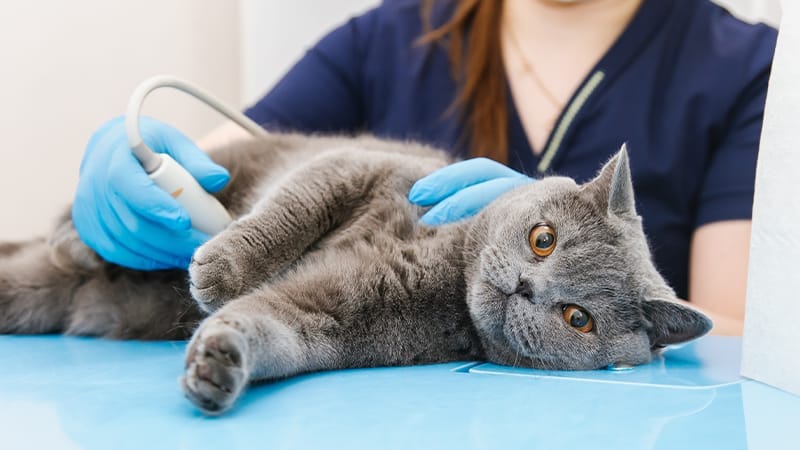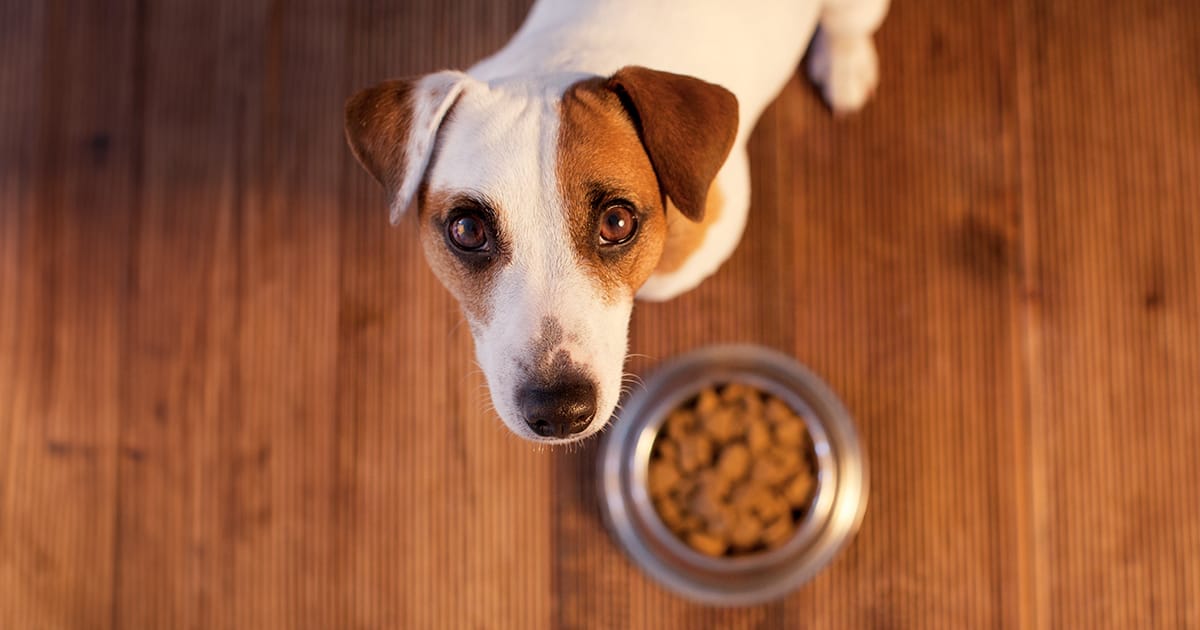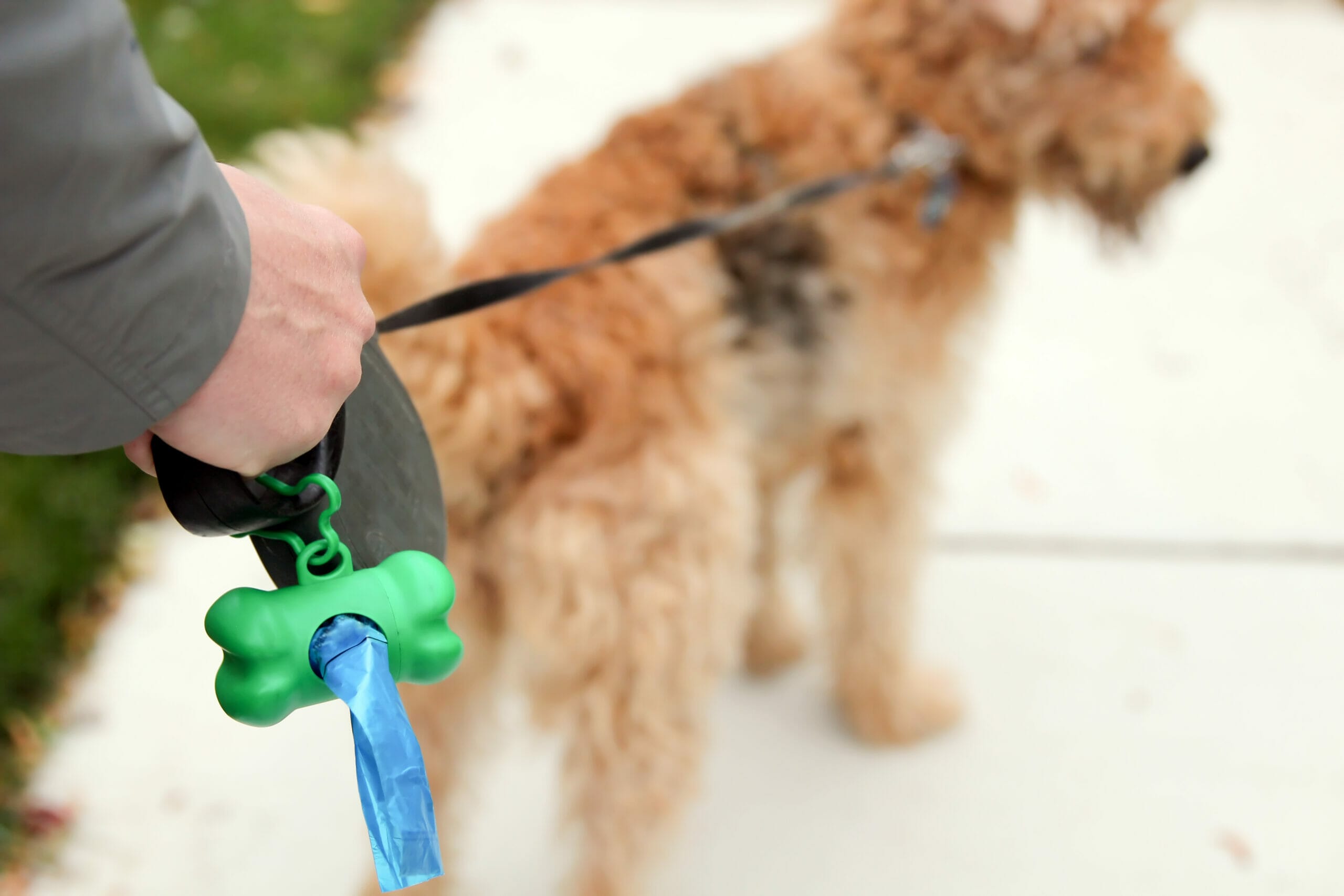Inflammatory Bowel Disease (IBD) in Dogs and Cats
Dogs and cats that have lost their appetite, are vomiting or have diarrhea could be suffering from IBD. Learn the signs and treatment.
When our furry companions have trouble eating or experience chronic vomiting or diarrhea, we want to identify the cause, prescribe the appropriate treatment, and ultimately improve their quality of life. One issue may be inflammatory bowel disease (IBD), which can affect both dogs and cats. The term chronic enteropathy may also be used; this means an abnormality of the intestinal tract. When we use the term IBD, we are referring to a complex and chronic condition that can involve any portion of the stomach, small intestine, and/ or large intestine.
What Causes IBD in Dogs and Cats?
The wall of the gastrointestinal (GI) tract is made up of defined layers with important roles that include protection from noxious contents, secretion of digestive enzymes, absorbing nutrients, and muscular contractions to move along the digestive process. In addition, cells of the immune system are normally present. With IBD, an increased number of inflammatory cells move in the GI tract walls, which can damage that protective barrier. Subsequently, the patient becomes more sensitive to allergens, leading to abnormal clinical signs (see below).
The cause of IBD may be idiopathic, which means it cannot be determined. A similar response by the body can be seen when patients have sensitivity to food, toxins, bacteria, intestinal parasites, or other infectious organisms. Factors such as genetics and alterations in the patient’s normal intestinal microflora can also contribute to the immune system’s abnormal response within the wall of the GI tract. A dysfunction of lymphatic vessels in the small intestine (lymphangiectasia) can also present similar concerns.
IBD is more commonly seen in middle-aged dogs and cats, but any age could be affected. Males and females are equally at risk, as well as any breed of dog or cat. Dog breeds with increased prevalence include German Shepherds, Yorkshire Terrier, Soft-coated Wheaten Terrier, Chinese Shar-Pei, and Basenji. In addition, Siamese cats are also predisposed to IBD.

What are the Signs of IBD in Dogs and Cats?
Possible signs that your dog or cat may have IBD include:
- Chronic vomiting or regurgitation
- Chronic diarrhea
- Changes in stool color
- Flatulence
- Borborygmus (gurgling gut sounds)
- Decreased (hyporexia) to loss of appetite (anorexia)
- Weight loss
How is IBD Diagnosed in Dogs and Cats?
IBD can be suspected based on a patient’s history, clinical signs, and results of diagnostic testing. A diagnosis of IBD is supported by excluding diseases with similar clinical signs.
Your veterinarian may run one or more of the following tests to rule out other causes or determine if your dog or cat has IBD:
- Bloodwork, including a complete blood count (CBC) and biochemistry profile
- Cobalamin (vitamin B12) and folate (vitamin B9) levels
- Serum trypsin-like immunoreactivity (TLI) or pancreatic lipase immunoreactivity (PLI) to evaluate for pancreatic disease
- Fecal examination to look for parasites
- Fecal alpha-protease inhibitor to evaluate for small intestinal protein loss
- ACTH stimulation test for Addison’s disease
- Abdominal ultrasound
Diet, medication, exposure to parasites, severity of signs and diagnostic test results factor in determining if your dog or cat has IBD. Depending on the severity of signs and results of tests, a diet feeding trial may be pursued. The idea is to feed a type of elimination diet (which could be hypoallergenic or novel protein and carbohydrate diet) to minimize or eliminate food that provokes an allergic reaction. To ensure there are no parasites in your pet’s GI tract, a dewormer medication and/or a course of antibiotic may be prescribed. Common parasites include roundworms, hookworms, whipworms and tapeworms.
Ultimately a diagnosis of IBD comes from biopsies collected from the stomach and intestines. This is usually done via endoscopy, and biopsies can also be obtained during abdominal surgery. The purpose of our diagnostic evaluation is to also evaluate for obstructive, metabolic, infectious, and neoplastic (abnormal mass of tissue) disease of the GI tract.

IBD vs. Cancer in Dogs and Cats
IBD and GI cancer in dogs and cats can have similar clinical signs of chronic persistent or intermittent diarrhea, vomiting, loss of appetite, and/or weight loss. The diagnostic tests we have discussed can also help determine if your dog or cat has cancer.
What is the Treatment for IBD in Dogs and Cats?
Your veterinarian will work with you to control the signs of IBD through managing your pet’s diet and administering appropriate medications. Treatment goals include reducing vomiting and diarrhea, improving appetite, and managing an appropriate weight. Treatment for IBD in dogs and cats may include:
- Corticosteroid therapy (commonly known as steroids) is often part of the treatment for dogs and cats with IBD. The dose is gradually decreased, based on your pet’s response to treatment. Some patients can eventually stop this medication, while others continue a low dose chronically.
- Diet is an important part of therapy. Your pet may be prescribed a hypoallergenic diet or a novel protein and carbohydrate diet. In addition, diets should be highly digestible. Some patients benefit from an increase in fiber in their diet. Dogs may need a low-fat diet when they have inflammation in the small intestine and poor protein absorption or lymphatic damage (lymphangiectasia). It is important to discuss everything your pet is being fed with your veterinarian, as well as any changes, to be sure a proper diet is still fed.
- Cobalamin (vitamin B12) supplementation is important for dogs or cats with low levels. Otherwise, there is risk of them having reduced metabolic processes or poor response to appropriate therapy. Your veterinarian can prescribe treatment by subcutaneous injection or by mouth.
- Immunosuppressive drugs may be prescribed if your dog or cat has a poor response to therapy or severe disease. Additional drugs used may include cyclosporine, chlorambucil, azathioprine, or sulfasalazine.
Some patients also need medications to control nausea or to help GI motility. Supplementation with prebiotics and probiotics can be helpful to help stool quality. The medication(s) chosen for your pet will be based on severity of clinical signs, laboratory testing, and results of biopsies (if obtained). Treatment will be adjusted over time, based on the patient’s response and tolerance of the therapy.
Can IBD in Dogs and Cats be Cured?
While IBD is not cured, we can effectively manage this condition. Most dogs and cats diagnosed with IBD will need lifelong adjustments to their diet or medical therapy. However, it is important to note that a small percentage of animals do not respond to treatment. These patients could have another disease not yet diagnosed, or they may not be responding to therapy.
It’s important to speak with your family veterinarian or MedVet doctor to review your dog’s or cat’s signs to determine if they have IBD or another health issue that could include food sensitivity, parasites or other infectious disease, gastrointestinal cancer, or other disease that has similar clinical presentation.
Click here to find a MedVet location near you.
FAQs
Find Us
If your dog or cat is experiencing IBD signs, visit your family veterinarian or find a MedVet location near you.
Our LocationsContents
Find Us
If your dog or cat is experiencing IBD signs, visit your family veterinarian or find a MedVet location near you.
Our Locations


